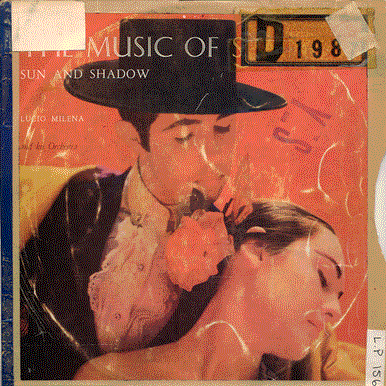

Lucio Milena and his Orchestra - SUN AND SHADOW -The Music of Spain

(
View LP Cover
)
SUN AND
SHADOW
|
SIDE 1 EL RELICARIO MORRINA LA PALOMA MALAGUENA LA LEYENDA DEL BESO DOS CRUCES PRINCESITA |
SIDE 2 DANZA DEL MOLINERO VALENCIA LOS EMIGRANTES LA VIOLETERA ALBORADA GALLEGA MADRID TE QUIERO |
|
|||
|
|
EL RELICARIO | ||
|
|
MORRINA | ||
|
|
LA PALOMA | ||
|
|
MALAGUENA | ||
|
|
LA LEYENDA DEL BESO | ||
|
|
DOS CRUCES | ||
|
|
PRINCESITA | ||
|
|
DANZA DEL MOLINERO | ||
|
|
VALENCIA | ||
|
|
LOS EMIGRANTES | ||
|
|
LA VIOLETERA | ||
|
|
ALBORADA GALLEGA | ||
|
|
MADRID | ||
|
|
TE QUIERO | ||
|
Lucio Milena and his Orchestra - SUN AND SHADOW
-The Music of Spain This can be seen in the land itself, a
place of burningly arid plains and lushly fantastic gardens, of stark,
towering mountains and enchanting coastal regions. It is in the history
of the Conquistadores and the Inquisition and the pomp of Spanish
courts, in the works of Goya and Velasquez and the adopted El Greco, in
the music of Falla and the composers of zarzuelas, in Cervantes and
Lorca. And it is especially evident in the music Lucio Milena presents
in this collection, passionate and sensual, deriving from folk music and
tingling with the elusive and magical atmosphere of Spain. |
|
|


